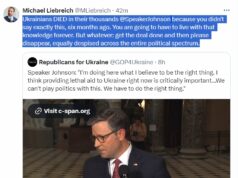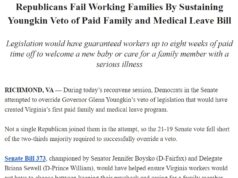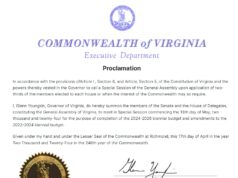
Article IV, section 1 of the Constitution (that document Republicans in the House have become fond of reading aloud at the start of each Congress) states, “Full Faith and Credit shall be given in each State to the public Acts, Records, and judicial Proceedings of every other State. And the Congress may by general Laws prescribe the Manner in which such Acts, Records and Proceedings shall be proved, and the Effect thereof.” Or, as the example given by USLegal.com explains, “For example, a marriage which is recognized and performed in state A should be considered as a valid marriage by state B even if state B does not recognize the type of marriage, for e.g. same-sex marriage.” Remember that marriage as recognized by a governmental entity is a legal “contract.”
So, by that reasoning the state of Virginia would have to recognize same-sex marriages from the states that grant them if a same-sex, married couple moves to Virginia, right? Doesn’t the Full Faith and Credit Clause override the denial of equal rights for such couples recently placed in the Virginia Constitution?
My other question has to do with Article IV, section 2 of the Constitution that reads, “The Citizens of each State shall be entitled to all Privileges and Immunities of Citizens in the several States.” According to USLegal.com, “Under this clause, people of all states shall enjoy free mobility between each state and also enjoy all privileges and immunities of free citizens in all the states.” So, how can the Federal government by a law like DOMA deny the “privilege” of a marriage granted by a state from being recognized as such by the Federal government?
DOMA states, “No State, territory, or possession of the United States, or Indian tribe, shall be required to give effect to any public act, record, or judicial proceeding of any other State, territory, possession, or tribe respecting a relationship between persons of the same sex that is treated as a marriage under the laws of such other State, territory, possession, or tribe, or a right or claim arising from such relationship.” Another question arises. Can the Federal government declare, in essence, that the Full Faith and Credit Clause does not apply to same-sex marriage? Wouldn’t such an exclusion need to be made in the form of a constitution amendment? Doesn’t such an exclusion also violate the 14th Amendment guarantee of equal protection under the law?
I’m no lawyer, nor have I ever wanted to be. But, I hope some legal minds out there can clear up my questions regarding these section of the supreme law of the land. This Supreme Court case that is in the news right now involves basic rights granted to American citizens to make life decisions. If we believe that no state can “deny to any person within its jurisdiction the equal protection of the laws,” isn’t the right to enter into a marriage contract with another person protected equally for all of us, regardless of our sexual orientation?
Please note that I am referring to civil marriage contracts, not to religious rites of any faith. I firmly believe that the government has no right to interfere with any religion that denies its rite of marriage to certain persons, nor does any religion have the right to interfere with a civil contract being extended to any person.


 Sign up for the Blue Virginia weekly newsletter
Sign up for the Blue Virginia weekly newsletter








